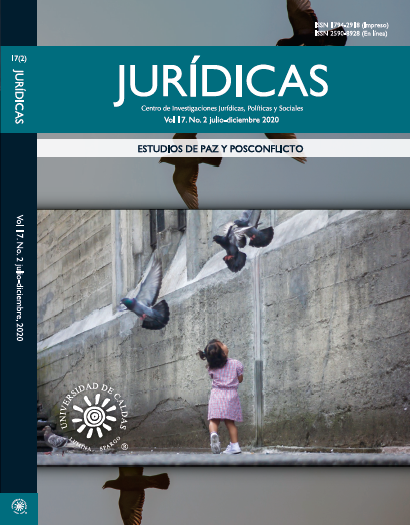Authors
Abstract
The peace agreement in Colombia was signed in the context of a constitution in force. The transitional justice instruments were implemented in multiple constitutional amendments that produced tensions against the current political regime. One of these constitutional amendments incorporated a special constitutional modification procedure to make the transitional justice process possible. In sentence C-332 of 2017, this constitutional amendment procedure was declared partially unconstitutional. The purpose of this article is to analyze how tensions between the interpretive rigidity of the constitution and transitional change are overcome. Therefore, it is argued that a transition process implies a flexible constitutional identity to adapt the current regime to the demands of transitional justice. The
constitutionality control carried out on the special constitutional amendment procedure can be read as a political control to the peace process and not as a legal control to the amendment procedure.
Keywords:
References
Albert, R. (2015). Amending Constitutional Amendment Rules. International Journal of Constitutional Law, 13(3), 655-685. DOI: https://doi.org/10.1093/icon/mov040
Baber, J.J. (2014). An analysis of different constitutional amendment models. Law School Student Scholarship, 435, 1-25. Recuperado de https://scholarship.shu.edu/student_scholarship/435
Barak, A. (2011). Unconstitutional Constitutional Amendments. Israel Law Review, 44 (3), 321-341. DOI: https://doi.org/10.1017/S0021223700018082
Benítez, V. (2013). El control de constitucionalidad de reformas constitucionales. Algunas salidas para una encrucijada contramayoritaria. En G. Mora-Restrepo y V.F. Benítez (eds.), Retos del derecho constitucional contemporáneo (pp. 177-198). Bogotá: Universidad de La Sabana y Astrea.
Benítez, V. (2014). Constitución popular, no judicial. Una teoría democrática del control de constitucionalidad de las reformas a la Constitución en Colombia. Bogotá: Temis y Universidad de La Sabana.
Bernal, C. (2013). Unconstitutional constitutional amendments in the case study of Colombia: An analysis of the justification and meaning of the constitutional replacement doctrine. International Journal of Constitutional Law, 11(2), 339-357. DOI: https://doi.org/10.1093/icon/mot007
Bernal, C. (2014a). Transitional Justice within the Framework of a Permanent Constitution: The Case Study of the Legal Framework for Peace in Colombia. Cambridge Journal of International and Comparative Law, 3(4), 1136-1163. DOI: https://doi.org/10.7574/cjicl.03.04.249
Bernal, C. (2014b). Informal Constitutional Change. A Critical Introduction and Appraisal. The American Journal of Comparative Law, 62(3), 493-514. DOI: https://doi.org/10.5131/AJCL.2014.0017
Bernal, C. (2018). Prescindamos del poder constituyente. Los límites conceptuales del poder para reemplazar o reformar una constitución. Anuario Iberoamericano de Justicia Constitucional, 22, 59-99. DOI: https://doi.org/10.18042/cepc/aijc.22.03
Bulygin, E. (1991). Tiempo y validez. En C. Alchourrón y E. Bulygin, E. Análisis lógico y derecho (pp. 195-214). Madrid: Centro de Estudios Constitucionales.
Colón-Ríos, J. (2018). Deliberative Democracy and the Doctrine of Unconstitutional Constitutional Amendments En R. Levy, H. Kong, G. Orr y J. King (eds.), The Cambridge Handbook of Deliberative Constitutionalism (pp. 271-281). Cambridge, UK: Cambridge University Press.
Corte Constitucional, Sentencia C-332 de 2017. Magistrado Ponente: Antonio José Lizarazo Ocampo.
Corte Constitucional, Sentencia C-551 de 2003. Magistrado Ponente: Eduardo Montealegre Lynett.
Corte Constitucional, Sentencia C-630 de 2017. Magistrados Ponentes: Luis Guillermo Guerrero Pérez y Antonio José Lizarazo Ocampo.
Corte Constitucional, Sentencia C-699 de 2016. Magistrada Ponente: María Victoria Calle Correa.
Dixon, R. & Landau, D. (2015). Transnational Constitutionalism and a Limited Doctrine of Unconstitutional Constitutional Amendment. International Journal of Constitutional Law, 13(3), 606-638. DOI: https://doi.org/10.1093/icon/mov039
Dixon, R. (2011). Transnational Constitutionalism and Unconstitutional Constitutional Amendments. University of Chicago Public Law & Legal Theory Working Paper, 349, 1-17. Recuperado de https://chicagounbound.uchicago.edu/public_law_and_legal_theory/357/
Ely, J.H. (1980). Democracy and Distrust. A Theory of Judicial Review. Cambridge, EU: Harvard University Press.
Fiss, O. (1998). Política y dinero. Isonomía, Revista de Teoría y Filosofía del Derecho, 8, 125-138. Recuperado de http://www.cervantesvirtual.com/nd/ark:/59851/bmcvh5x7
Gargarella, R. (2011). La justicia frente al gobierno. Sobre el carácter contramayoritario del poder judicial. Quito: Centro de Estudios y Difusión del Derecho Constitucional.
Gargarella, R. (2016). Scope and Limits of Dialogic Constitutionalism. En T. Bustamante & B. Gonçalves (eds.), Democratizing Constitutional Law. Perspectives on Legal Theory and the Legitimacy of Constitutionalism (pp. 199-146). Cham: Switzerland, Springer.
Guastini, R. (2014). Interpretar y argumentar. Trad. Silvina Álvarez. Madrid: Centro Estudios Políticos y Constitucionales.
Guastini, R. (2015). La interpretación de la constitución. En J.L. Fabra Zamora & E. Spector (eds.), Enciclopedia de filosofía del derecho y teoría jurídica Vol. 3 (pp. 2011-2086). México D.F.: Universidad Nacional Autónoma de México e Instituto de Investigaciones Jurídicas.
Jacobsohn, G. (2004). The Permeability of Constitutional Borders. Texas Law Review, 82, 1763-1818.
Landau, D. (2013). Abusive Constitutionalism. UC Davis Law Review, 47(189), 189-260. Recuperado de https://ssrn.com/abstract=2244629
Moreso, J.J. (1991). Disposiciones de reforma constitucional. Doxa, 10, 201-222.
Nino, C. (1996). The Constitution of Deliberative Democracy. New Haven: EU: Yale University press.
Nino, C.S. (2013). Fundamentos de derecho constitucional. Análisis filosófico, jurídico y politológico de la práctica constitucional. Buenos Aires: Editorial Astrea.
Pino, G. (2018). El constitucionalismo de los derechos. Estructura y límites del constitucionalismo contemporáneo. Puno: Zela.
Pulido-Ortiz, F.E. (2017). La validez de los procedimientos de reforma constitucional fast track. International Law, Revista Colombiana de Derecho Internacional, 30, 151-184. DOI: https://doi. org/10.11144/Javeriana.il15-30.vprc
Ross, A. (1969). On Self-Reference and a Puzzle in Constitutional Law. Mind, 78(309), 1-24.
Roznai, Y. (2017). Unconstitutional Constitutional Amendments. The Limits of Amendment Powers. Oxford, UK: Oxford University Press.
Teitel, R. (2017). Justicia transicional. Bogotá: Universidad Externado de Colombia.
Waldron, J. (2005). Derecho y desacuerdos. Trad. J.L. Martí & A. Quiroga. Madrid: Marcial Pons.

 PDF (Español)
PDF (Español)
 FLIP
FLIP
 Perfil Google Scholar
Perfil Google Scholar





















